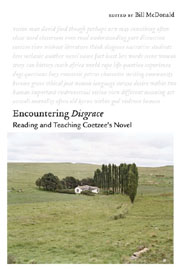Book contents
- Frontmatter
- Contents
- Acknowledgments
- Introduction
- I Reading Disgrace
- 1 “We are not asked to condemn”: Sympathy, Subjectivity, and the Narration of Disgrace
- 2 Beyond Sympathy: A Bakhtinian Reading of Disgrace
- 3 “Is it too late to educate the eye?”: David Lurie, Richard of St. Victor, and “vision as eros” in Disgrace
- 4 Disgrace and the Neighbor: An Interchange with Bill McDonald
- 5 To Live as Dogs or Pigs Live Under Us: Accepting What's on Offer in Disgrace
- 6 Tenuous Arrangements: The Ethics of Rape in Disgrace
- 7 Dis(g)race, or White Man Writing
- 8 Clerk in a Post-Religious Age: Reading Lurie's Remnant Romantic Temperament in Disgrace
- 9 Saying it Right in Disgrace: David Lurie, Faust, and the Romantic Conception of Language
- 10 The Dispossession of David Lurie
- II Reading Disgrace with Others
- Works Cited
- Notes on the Contributors
- Index
5 - To Live as Dogs or Pigs Live Under Us: Accepting What's on Offer in Disgrace
from I - Reading Disgrace
Published online by Cambridge University Press: 12 September 2012
- Frontmatter
- Contents
- Acknowledgments
- Introduction
- I Reading Disgrace
- 1 “We are not asked to condemn”: Sympathy, Subjectivity, and the Narration of Disgrace
- 2 Beyond Sympathy: A Bakhtinian Reading of Disgrace
- 3 “Is it too late to educate the eye?”: David Lurie, Richard of St. Victor, and “vision as eros” in Disgrace
- 4 Disgrace and the Neighbor: An Interchange with Bill McDonald
- 5 To Live as Dogs or Pigs Live Under Us: Accepting What's on Offer in Disgrace
- 6 Tenuous Arrangements: The Ethics of Rape in Disgrace
- 7 Dis(g)race, or White Man Writing
- 8 Clerk in a Post-Religious Age: Reading Lurie's Remnant Romantic Temperament in Disgrace
- 9 Saying it Right in Disgrace: David Lurie, Faust, and the Romantic Conception of Language
- 10 The Dispossession of David Lurie
- II Reading Disgrace with Others
- Works Cited
- Notes on the Contributors
- Index
Summary
No Country, This, for Old Men
As much as ever would we like to hold in our arms the beauty of all the world. It never wanes in us, that yearning. But the beauty of all the world does not want any of us. So we have to make do with less, a great deal less. In fact, we have to accept what is on offer or else go hungry.
— J. M. Coetzee, Slow ManIn Disgracewe all make do with a great deal less. The characters lose much certainly, but from the beginning the prose of Disgrace seems underpopulated. Through its free indirect style, we observe David Lurie clearly enough, with little else to distract us, but we observe him, as it were, telescopically, with each item in his mental inventory at the same middle distance from us. This is a narrative without close-ups.
What we discover in Disgrace are the limits of Lurie's ethical understanding, and possibly our own. The book proposes different methods of situating ourselves ethically — Romantic, institutional, aesthetical, allegorical — but eventually reveals all of these as inadequate. All of these methods rest on the illusion that other people are ultimately comprehensible to our own imaginative sympathy. The consequences of this, as played out in Coetzee's plot and language, are to collapse the grounds of our usual ethical methods. Without this foundation, the possibility of raising an ethical society (in post-apartheid South Africa or anywhere else) seems impossible.
- Type
- Chapter
- Information
- Encountering 'Disgrace'Reading and Teaching Coetzee's Novel, pp. 106 - 115Publisher: Boydell & BrewerPrint publication year: 2009

